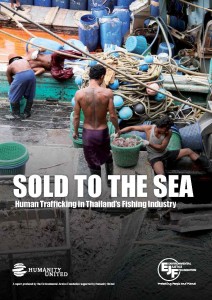Posts Tagged ‘Labor Rights’ (29 found)
On Labour Organisations in Myanmar
When Myanmar’s new Labour Organisation Law was promulgated in October 2011 it brought to an end a period of nearly 50 years during which independent workers’ organisations had been effectively prohibited. Amidst the more open political climate of reform-era Myanmar, labour-related organisations and workers’ unions have proliferated. The result is that some 500 organisations took part in the recent ILO-organised Labour Organisations Conference held in Yangon from 30 April to 1 May 2013 […]
• •Sold to the Sea: Human Trafficking in Thailand’s Fishing Industry
 Human trafficking is a global problem. It is estimated that as many as 27 million men, women and children are currently victims of human trafficking around the world.
Human trafficking is a global problem. It is estimated that as many as 27 million men, women and children are currently victims of human trafficking around the world.
Thailand is the 32nd largest economy in the world, with a GDP of $377 billion and a growth rate of 5.5 per cent in 2012.2/3 It also has one of the lowest unemployment rates globally, at 0.5 per cent in December 2012.
Thailand’s economy is heavily reliant on labour-intensive industries. However, growing economic prosperity since the late 1980s has seen a decline in the available Thai workforce needed to meet the labour demand.5 In 2009, Thailand’s Ministry of Labour estimated that an additional 116,000 workers would be needed to address the labour-market imbalance […]
• • •Labour Activist Jailed For Cutting Down A Tree
A labour activist has been jailed for 7 and half years after being falsely accused of cutting down trees.
Burma Campaign UK today urged Hugo Swire MP, British Foreign Office Minister with responsibility for Burma to do more to push the military-backed government in Burma to release Myint Soe and all remaining political prisoners in Burma […]
• • •Forced Labour Still Prevails: An Overview of Forced Labour Practices in North Arakan, Burma
This report by the Arakan Project offers an overview of forced labour practices in Northern Arakan/Rakhine State of Burma/Myanmar over a 6-month period – from November 2011 to May 2012 […]
• • •Protests Demanding Increased Power Supply Illustrates Burma’s Unpreparedness for Influx of Foreign Investment
Last week saw various inspiring actions bravely undertaken by the people against injustice and the government’s irresponsibility in fulfilling their daily needs such as electricity. There were actions against land confiscations, low wages, violations of labor rights, and, largest of all, against the significant shortage of power in various areas across Burma.
During the past few weeks there have been worker strikes in as many as 20 different factories. These include the 25 people on hunger strike that continued into its second day on Saturday at Yangon Crown Steel factory in Hmawbi, Yangon Division, where almost 400 workers have been on strike since May 20. Despite the number of worker strikes, only a few have had successful negotiations with factory owners. Many have suggested that this is due to the lack of a government policy outlining a minimum wage and laws that protect the rights of workers. This is a reminder again of how the government is unprepared to accommodate foreign investment and manage the type of development it will bring […]
• • •Steel Workers Go on Hunger Strike
Around 25 workers at a Chinese-owned steel factory in Rangoon Division announced on Friday that they will begin a hunger strike in response to the company’s refusal to raise wages […]
• •JVC Unjustly Discriminates Against Burmese Migrant Women Workers Who Claim Worker Rights
We, the undersigned 79 civil society organizations and groups, would like to express our serious concern that JVC has indicated that they will not re-new the employment contracts of Pa Pa Aye and 15 other Burmese women migrant workers, who lodged a claim at the Labour Department claiming worker rights that the JVC company had violated, amongst them the wrongful deduction of their wages to recover levy that employers have to pay when they employ foreign workers […]
• • •Over 1000 Workers Continue the 3rd Day of Strike at Fishing Net Factory
Holding a temporary passport has given no protection of the rights of Burmese workers at the Dechapanich Fishing Net Factory in Khon Kaen. The workers have to work one and a half hours free every day from 5.00pm to 6.30pm to pay off the cost of the passport and are not allowed to maintain possession of their passports. When six workers were fired for taking more than three days leave a month, they demanded the return of their personal documents, and found that the word “cancel” had been casually written next to their visa […]
• • •2009 Country Reports on Human Rights Practices: Burma
Bureau of Democracy, Human Rights, and Labor
Burma, with an estimated population of 54 million, is ruled by a highly authoritarian military regime dominated by the majority ethnic Burman group. The State Peace and Development Council (SPDC), led by Senior General Than Shwe, was the country’s de facto government. Military officers wielded the ultimate authority at each level of government. […]
We Will Continue our Fights until we Achieve Full Basic Workers’ Rights
No. 3/2010 (WFSLB)
1. In harmony and solidarity, we, sisters and brothers from different factories of Hlaing Thar Yar, Insein, Shwe Pyi Thar and Mingalar Done of Rangoon Division, have been holding peaceful strikes and sit-ins to get full basic workers’ rights, which is a common and urgent concern for us all.
2. The salary increase for government servants in January 2010 brought a sharp increase in commodity prices. Consequently, Burmese workers who already had to survive on less than livable wages and have long suffered from the critical economic situation of Burma, now face double daily hardships. […]









 All posts
All posts